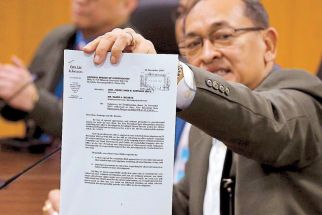Text messages mobilize crowds, spread rumors in RP
February 28, 2006 | 12:00am
They come in droves, sometimes two or three at a time. Their origin often unknown, they spread like a plague, and can be just as lethal in a fragile democracy like the Philippines.
Mobile phone text messages helped mobilize hundreds of thousands of Filipinos in 2001 to a massive street protest that swept out former President Joseph Estrada on corruption allegations, replacing him with Gloria Macapagal Arroyo.
Five years later, text messaging again is proving an indispensable political tool for disseminating news — and wild rumors — while mobilizing supporters.
But this time, Mrs. Arroyo is the target, especially after she declared a state of emergency last Friday to quell a coup plot against her.
Thousands of opposition protesters responded to the declaration by marching along Manila’s main thoroughfare as word of the crackdown spread like brush fire, thumbs furiously forwarding messages as fast as they were received.
Two days later, after news that the head of the marines was relieved of his duties, it took less than an hour for his supporters — alerted by text messages, of course — to gather outside the marine headquarters, sparking a five-hour standoff that ended peacefully, but not without its tense moments.
In a country with more mobile phones than fixed telephone lines, texting is cheap and fast, and it is often difficult to pinpoint the source — a key selling point in the murky world of political dirty tricks.
"Marines taking vote whether to withdraw support at navy golf course," read one.
"Finance Secretary Teves resigned," read another.
Neither turned out to be true. Neither did the claim that reinforcements for the disaffected marines were on the way like a cavalry.
But it didn’t matter to whomever originated the false reports, because they clearly wanted to capitalize on an emotionally charged moment, hoping to attract the critical mass of demonstrators to spawn another "people power" revolt.
Malacañang claimed that San Juan Mayor JV Ejercito, Estrada’s son, was cranking out a deliberate campaign of disinformation. Ejercito denied it. — AP
Mobile phone text messages helped mobilize hundreds of thousands of Filipinos in 2001 to a massive street protest that swept out former President Joseph Estrada on corruption allegations, replacing him with Gloria Macapagal Arroyo.
Five years later, text messaging again is proving an indispensable political tool for disseminating news — and wild rumors — while mobilizing supporters.
But this time, Mrs. Arroyo is the target, especially after she declared a state of emergency last Friday to quell a coup plot against her.
Thousands of opposition protesters responded to the declaration by marching along Manila’s main thoroughfare as word of the crackdown spread like brush fire, thumbs furiously forwarding messages as fast as they were received.
Two days later, after news that the head of the marines was relieved of his duties, it took less than an hour for his supporters — alerted by text messages, of course — to gather outside the marine headquarters, sparking a five-hour standoff that ended peacefully, but not without its tense moments.
In a country with more mobile phones than fixed telephone lines, texting is cheap and fast, and it is often difficult to pinpoint the source — a key selling point in the murky world of political dirty tricks.
"Marines taking vote whether to withdraw support at navy golf course," read one.
"Finance Secretary Teves resigned," read another.
Neither turned out to be true. Neither did the claim that reinforcements for the disaffected marines were on the way like a cavalry.
But it didn’t matter to whomever originated the false reports, because they clearly wanted to capitalize on an emotionally charged moment, hoping to attract the critical mass of demonstrators to spawn another "people power" revolt.
Malacañang claimed that San Juan Mayor JV Ejercito, Estrada’s son, was cranking out a deliberate campaign of disinformation. Ejercito denied it. — AP
BrandSpace Articles
<
>
- Latest
- Trending
Trending
Latest
Trending
Latest
Recommended
































